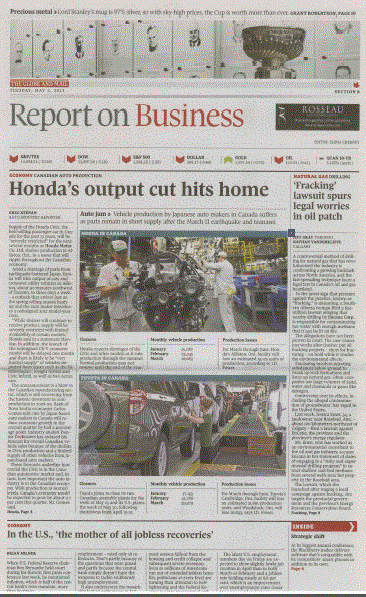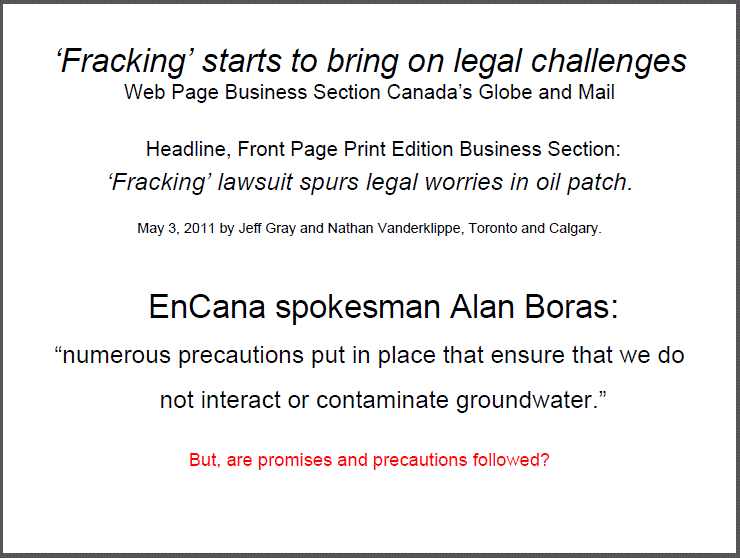‘Fracking’ starts to bring on legal challenges by Jeff Gray and Nathan Vanderklippe, The Globe and Mail, May 2, 2011
“I’m not the only one. There are many others that this has happened to, and my story is not unique,” Ms. Ernst said in an interview from New York, where she is taking part in a panel discussion on fracking being held at the United Nations.
A controversial method of drilling for natural gas that has revolutionized the industry is confronting a growing backlash across North America, and the fast-spreading technique faces a legal test in Canada’s oil and gas heartland.
In the latest sign that pressure against the practice, known as “fracking,” is mounting, a Southern Alberta woman filed a $33-million lawsuit alleging that nearby drilling by Encana Corp. is responsible for contaminating her water with enough methane that it can be lit on fire.
The allegations have not been proven in court. The case comes just weeks after Quebec put all projects using fracking – short for fracturing – on hold while it studies the environmental effects.
Fracturing involves injecting substances below ground to break up rock formations and force up natural gas. Often companies use large volumes of sand, water and chemicals. In other places, they use gases like nitrogen.
Controversy over its effects, including the alleged contamination of groundwater, has raged in the United States.
Last week, Jessica Ernst, 54, a landowner near Rosebud, Alta. – about 120 kilometres northeast of Calgary – filed a lawsuit against EnCana, the province and the province’s energy regulator.
Ms. Ernst, who has worked as an environmental consultant to the oil and gas industry, accuses Encana in her statement of claim of engaging in a “risky and experimental drilling program” to extract shallow coal-bed methane from several wells near her property in the Rosebud area.
The lawsuit, which she launched after waging a long local campaign against fracking, also targets the provincial government and the province’s Energy Resources Conservation Board, which she accuses of failing to police the industry since her water starting irritating her skin in 2004.
“I’m not the only one. There are many others that this has happened to, and my story is not unique,” Ms. Ernst said in an interview from New York, where she is taking part in a panel discussion on fracking being held at the United Nations.
The fracturing used to extract coal-bed methane is technically different from methods employed in extraction of shale gas, which has generated major controversy around the globe. But the alleged impacts are largely the same, as are the questions surrounding how industry taps novel energy sources.
Encana spokesman Alan Boras defended the company’s natural gas production, saying it is safe and that there are “numerous precautions put in place that ensure that we do not interact or contaminate groundwater.”
He said homes around Rosebud regularly encounter natural gas in water wells because they have been driven into shallow coal seams.
A spokeswoman for the Energy Resources Conservation Board declined to comment, saying the matter was before the courts. Alberta Environment also declined to comment on the lawsuit.
One Toronto environmental lawyer says there are other legal cases like Ms. Ernst’s that could surface soon against others in the industry. Dianne Saxe, who is not involved with Ms. Ernst’s lawsuit, says she has been approached on a similar case in Alberta, and there are other disputes.
The stakes are high, as shale gas has proven to be a resource almost unlike any other. Last month, the U.S. Energy Information Administration said the world contains 6,600 trillion cubic feet of technically recoverable shale gas. Today’s centres of production, the U.S. and Canada, make up just 19 per cent of the total.
Governments in South Africa and France, like Quebec, have both halted fracturing until more research can be done.
Nervousness about the technology hasn’t been helped by high-profile accidents, such as a blowout two weeks ago at a well belonging to Chesapeake Energy Corp.
Still, the industry has long argued that fracking is safe – and that the chief problem facing companies is their operations in areas where people are unfamiliar with drilling.
“As a result, there is a public angst about what is actually potentially going to happen when companies go in,” said Mike Dawson, the president of the Canadian Society for Unconventional Gas, an industry-supported group.
Early forms of fracturing have been used since soon after the end of the Second World War. Modern fracking is, however, far more powerful and efficient, and uses chemical cocktails.
“The amount of chemicals and the usage of the chemicals has been blown out of proportion,” Mr. Dawson said. “Most of the time, it’s in the parts per million.”
Still, those in industry acknowledge that fracking uses a tremendous amount of resources, including water, which is pumped down wells in great volumes. That has stirred concerns not only in densely populated areas, but also in places with a friendly history toward oil and gas.
In northeastern British Columbia, for example, the rise in water-intensive fracking has coincided with a drought period.
Mike Bernier, the mayor of Dawson Creek, B.C., which has recently hired a “water steward” to help sort out competing water needs, called his town’s water supply “very fragile.”
“One of the concerns is if the oil and gas industry goes out there and takes too much water before it gets to the city,” he said.
That has made for difficult choices.
“We’ve done very well with the oil and gas sector, and we’re promoting it,” Mr. Bernier said. “If we say, don’t use the water, there’s no more oil and gas. So it’s a circle you have to balance very carefully.”
[Refer also to:
May 3, 2011: Is hydraulic fracturing safe and sustainable? Ernst presentation in New York City at the United Nations 19th Commission on Sustainable Development
Slide from Ernst presentation at United Nations in New York City, May 3, 2011, date this article was published.


